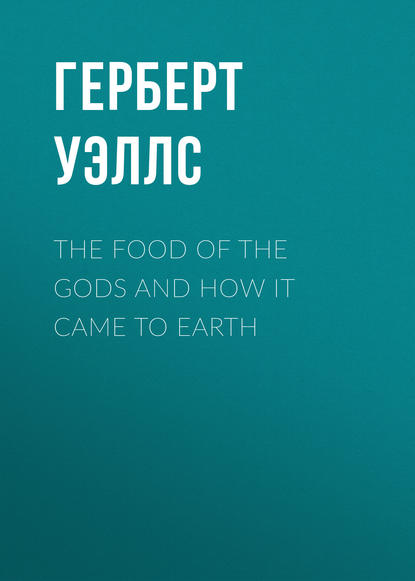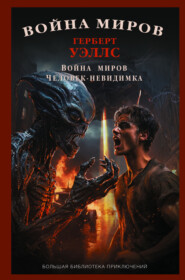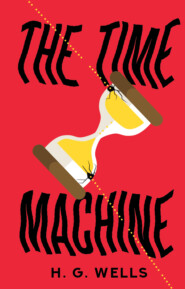По всем вопросам обращайтесь на: info@litportal.ru
(©) 2003-2025.
✖
The Food of the Gods and How It Came to Earth
Настройки чтения
Размер шрифта
Высота строк
Поля
"You'll have to go back to Mrs. Skinner," said Redwood. "You can't leave her there alone all night."
"Not alone, Thir, I don't. Not if there wath a dothen Mithith Thkinnerth. Itth Mithter Benthington – "
"Nonsense," said Redwood. "The wasps will be all right at night. And the earwigs will get out of your way – "
"But about the ratth?"
"There aren't any rats," said Redwood.
VI
Mr. Skinner might have foregone his chief anxiety. Mrs. Skinner did not stop out her day.
About eleven the canary creeper, which had been quietly active all the morning, began to clamber over the window and darken it very greatly, and the darker it got the more and more clearly Mrs. Skinner perceived that her position would speedily become untenable. And also that she had lived many ages since Skinner went. She peered out of the darkling window, through the stirring tendrils, for some time, and then went very cautiously and opened the bedroom door and listened…
Everything seemed quiet, and so, tucking her skirts high about her, Mrs. Skinner made a bolt for the bedroom, and having first looked under the bed and locked herself in, proceeded with the methodical rapidity of an experienced woman to pack for departure. The bed had not been made, and the room was littered with pieces of the creeper that Skinner had hacked off in order to close the window overnight, but these disorders she did not heed. She packed in a decent sheet. She packed all her own wardrobe and a velveteen jacket that Skinner wore in his finer moments, and she packed a jar of pickles that had not been opened, and so far she was justified in her packing. But she also packed two of the hermetically closed tins containing Herakleophorbia IV. that Mr. Bensington had brought on his last visit. (She was honest, good woman – but she was a grandmother, and her heart had burned within her to see such good growth lavished on a lot of dratted chicks.)
And having packed all these things, she put on her bonnet, took off her apron, tied a new boot-lace round her umbrella, and after listening for a long time at door and window, opened the door and sallied out into a perilous world. The umbrella was under her arm and she clutched the bundle with two gnarled and resolute hands. It was her best Sunday bonnet, and the two poppies that reared their heads amidst its splendours of band and bead seemed instinct with the same tremulous courage that possessed her.
The features about the roots of her nose wrinkled with determination. She had had enough of it! All alone there! Skinner might come back there if he liked.
She went out by the front door, going that way not because she wanted to go to Hickleybrow (her goal was Cheasing Eyebright, where her married daughter resided), but because the back door was impassable on account of the canary creeper that had been growing so furiously ever since she upset the can of food near its roots. She listened for a space and closed the front door very carefully behind her.
At the corner of the house she paused and reconnoitred…
An extensive sandy scar upon the hillside beyond the pine-woods marked the nest of the giant Wasps, and this she studied very earnestly. The coming and going of the morning was over, not a wasp chanced to be in sight then, and except for a sound scarcely more perceptible than a steam wood-saw at work amidst the pines would have been, everything was still. As for earwigs, she could see not one. Down among the cabbage indeed something was stirring, but it might just as probably be a cat stalking birds. She watched this for a time.
She went a few paces past the corner, came in sight of the run containing the giant chicks and stopped again. "Ah!" she said, and shook her head slowly at the sight of them. They were at that time about the height of emus, but of course much thicker in the body – a larger thing altogether. They were all hens and five all told, now that the two cockerels had killed each other. She hesitated at their drooping attitudes. "Poor dears!" she said, and put down her bundle; "they've got no water. And they've 'ad no food these twenty-four hours! And such appetites, too, as they 'ave!" She put a lean finger to her lips and communed with herself.
Then this dirty old woman did what seems to me a quite heroic deed of mercy. She left her bundle and umbrella in the middle of the brick path and went to the well and drew no fewer than three pailfuls of water for the chickens' empty trough, and then while they were all crowding about that, she undid the door of the run very softly. After which she became extremely active, resumed her package, got over the hedge at the bottom of the garden, crossed the rank meadows (in order to avoid the wasps' nest) and toiled up the winding path towards Cheasing Eyebright.
She panted up the hill, and as she went she paused ever and again, to rest her bundle and get her breath and stare back at the little cottage beside the pine-wood below. And when at last, when she was near the crest of the hill, she saw afar off three several wasps dropping heavily westward, it helped her greatly on her way.
She soon got out of the open and in the high banked lane beyond (which seemed a safer place to her), and so up by Hickleybrow Coombe to the downs. There at the foot of the downs where a big tree gave an air of shelter she rested for a space on a stile.
Then on again very resolutely…
You figure her, I hope, with her white bundle, a sort of erect black ant, hurrying along the little white path-thread athwart the downland slopes under the hot sun of the summer afternoon. On she struggled after her resolute indefatigable nose, and the poppies in her bonnet quivered perpetually and her spring-side boots grew whiter and whiter with the downland dust. Flip-flap, flip-flap went her footfalls through the still heat of the day, and persistently, incurably, her umbrella sought to slip from under the elbow that retained it. The mouth wrinkle under her nose was pursed to an extreme resolution, and ever and again she told her umbrella to come up or gave her tightly clutched bundle a vindictive jerk. And at times her lips mumbled with fragments of some foreseen argument between herself and Skinner.
And far away, miles and miles away, a steeple and a hanger grew insensibly out of the vague blue to mark more and more distinctly the quiet corner where Cheasing Eyebright sheltered from the tumult of the world, recking little or nothing of the Herakleophorbia concealed in that white bundle that struggled so persistently towards its orderly retirement.
VII
So far as I can gather, the pullets came into Hickleybrow about three o'clock in the afternoon. Their coming must have been a brisk affair, though nobody was out in the street to see it. The violent bellowing of little Skelmersdale seems to have been the first announcement of anything out of the way. Miss Durgan of the Post Office was at the window as usual, and saw the hen that had caught the unhappy child, in violent flight up the street with its victim, closely pursued by two others. You know that swinging stride of the emancipated athletic latter-day pullet! You know the keen insistence of the hungry hen! There was Plymouth Rock in these birds, I am told, and even without Herakleophorbia that is a gaunt and striding strain.
Probably Miss Durgan was not altogether taken by surprise. In spite of Mr. Bensington's insistence upon secrecy, rumours of the great chicken Mr. Skinner was producing had been about the village for some weeks.
"Lor!" she cried, "it's what I expected."
She seems to have behaved with great presence of mind. She snatched up the sealed bag of letters that was waiting to go on to Urshot, and rushed out of the door at once. Almost simultaneously Mr. Skelmersdale himself appeared down the village, gripping a watering-pot by the spout, and very white in the face. And, of course, in a moment or so every one in the village was rushing to the door or window.
The spectacle of Miss Durgan all across the road, with the entire day's correspondence of Hickleybrow in her hand, gave pause to the pullet in possession of Master Skelmersdale. She halted through one instant's indecision and then turned for the open gates of Fulcher's yard. That instant was fatal. The second pullet ran in neatly, got possession of the child by a well-directed peck, and went over the wall into the vicarage garden.
"Charawk, chawk, chawk, chawk, chawk, chawk!" shrieked the hindmost hen, hit smartly by the watering-can Mr. Skelmersdale had thrown, and fluttered wildly over Mrs. Glue's cottage and so into the doctor's field, while the rest of those Gargantuan birds pursued the pullet, in possession of the child across the vicarage lawn.
"Good heavens!" cried the Curate, or (as some say) something much more manly, and ran, whirling his croquet mallet and shouting, to head off the chase.
"Stop, you wretch!" cried the curate, as though giant hens were the commonest facts in life.
And then, finding he could not possibly intercept her, he hurled his mallet with all his might and main, and out it shot in a gracious curve within a foot or so of Master Skelmersdale's head and through the glass lantern of the conservatory. Smash! The new conservatory! The Vicar's wife's beautiful new conservatory!
It frightened the hen. It might have frightened any one. She dropped her victim into a Portugal laurel (from which he was presently extracted, disordered but, save for his less delicate garments, uninjured), made a flapping leap for the roof of Fulcher's stables, put her foot through a weak place in the tiles, and descended, so to speak, out of the infinite into the contemplative quiet of Mr. Bumps the paralytic – who, it is now proved beyond all cavil, did, on this one occasion in his life, get down the entire length of his garden and indoors without any assistance whatever, bolt the door after him, and immediately relapse again into Christian resignation and helpless dependence upon his wife…
The rest of the pullets were headed off by the other croquet players, and went through the vicar's kitchen garden into the doctor's field, to which rendezvous the fifth also came at last, clucking disconsolately after an unsuccessful attempt to walk on the cucumber frames in Mr. Witherspoon's place.
They seem to have stood about in a hen-like manner for a time, and scratched a little and chirrawked meditatively, and then one pecked at and pecked over a hive of the doctor's bees, and after that they set off in a gawky, jerky, feathery, fitful sort of way across the fields towards Urshot, and Hickleybrow Street saw them no more. Near Urshot they really came upon commensurate food in a field of swedes; and pecked for a space with gusto, until their fame overtook them.
The chief immediate reaction of this astonishing irruption of gigantic poultry upon the human mind was to arouse an extraordinary passion to whoop and run and throw things, and in quite a little time almost all the available manhood of Hickleybrows and several ladies, were out with a remarkable assortment of flappish and whangable articles in hand – to commence the scooting of the giant hens. They drove them into Urshot, where there was a Rural Fete, and Urshot took them as the crowning glory of a happy day. They began to be shot at near Findon Beeches, but at first only with a rook rifle. Of course birds of that size could absorb an unlimited quantity of small shot without inconvenience. They scattered somewhere near Sevenoaks, and near Tonbridge one of them fled clucking for a time in excessive agitation, somewhat ahead of and parallel with the afternoon boat express – to the great astonishment of every one therein.
And about half-past five two of them were caught very cleverly by a circus proprietor at Tunbridge Wells, who lured them into a cage, rendered vacant through the death of a widowed dromedary, by scattering cakes and bread…
VIII
When the unfortunate Skinner got out of the South-Eastern train at Urshot that evening it was already nearly dusk. The train was late, but not inordinately late – and Mr. Skinner remarked as much to the station-master. Perhaps he saw a certain pregnancy in the station-master's eye. After the briefest hesitation and with a confidential movement of his hand to the side of his mouth he asked if "anything" had happened that day.
"How d'yer mean?" said the station-master, a man with a hard, emphatic voice.
"Thethe 'ere waptheth and thingth."
"We 'aven't 'ad much time to think of waptheth," said the station-master agreeably. "We've been too busy with your brasted 'ens," and he broke the news of the pullets to Mr. Skinner as one might break the window of an adverse politician.
"You ain't 'eard anything of Mithith Thkinner?" asked Skinner, amidst that missile shower of pithy information and comment.
"No fear!" said the station-master – as though even he drew the line somewhere in the matter of knowledge.
"I mutht make inquireth bout thith," said Mr. Skinner, edging out of reach of the station-master's concluding generalisations about the responsibility attaching to the excessive nurture of hens…
Going through Urshot Mr. Skinner was hailed by a lime-burner from the pits over by Hankey and asked if he was looking for his hens.
"You ain't 'eard anything of Mithith Thkinner?" he asked.
The lime-burner – his exact phrases need not concern us – expressed his superior interest in hens…
It was already dark – as dark at least as a clear night in the English June can be – when Skinner – or his head at any rate – came into the bar of the Jolly Drovers and said: "Ello! You 'aven't 'eard anything of thith 'ere thtory bout my 'enth, 'ave you?"
"Oh, 'aven't we!" said Mr. Fulcher. "Why, part of the story's been and bust into my stable roof and one chapter smashed a 'ole in Missis Vicar's green 'ouse – I beg 'er pardon – Conservarratory."
Skinner came in. "I'd like thomething a little comforting," he said, "'ot gin and water'th about my figure," and everybody began to tell him things about the pullets.

















